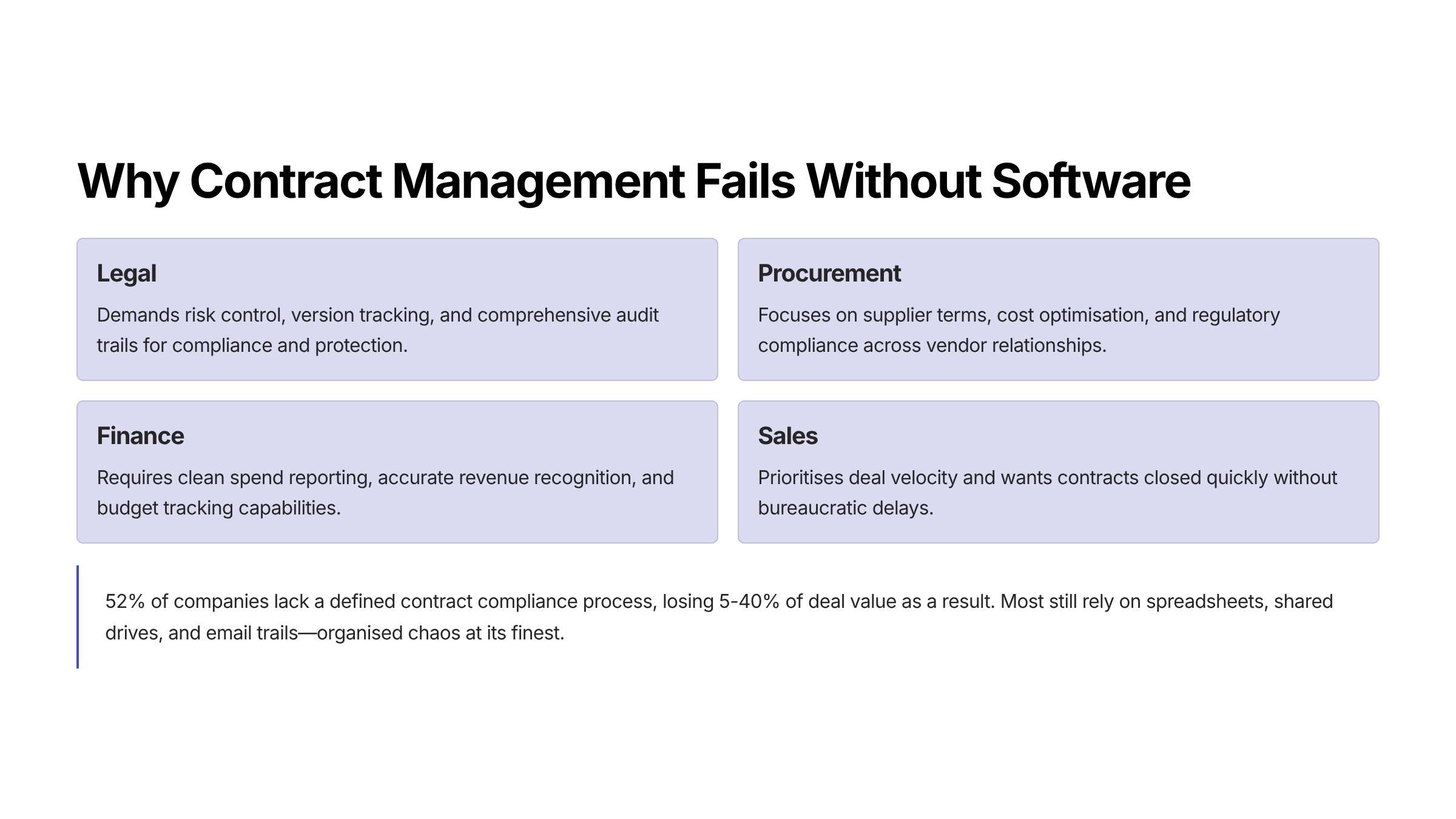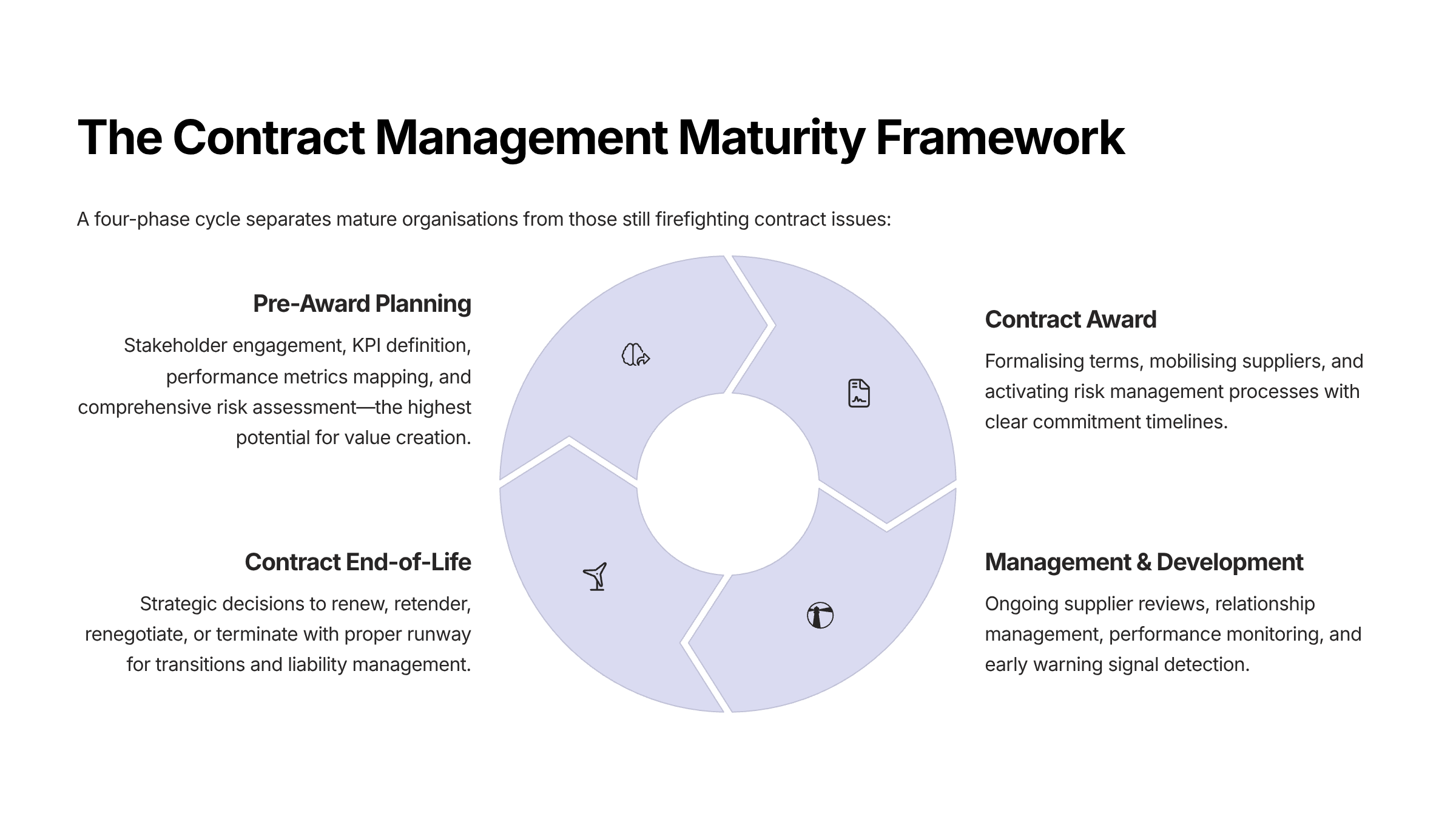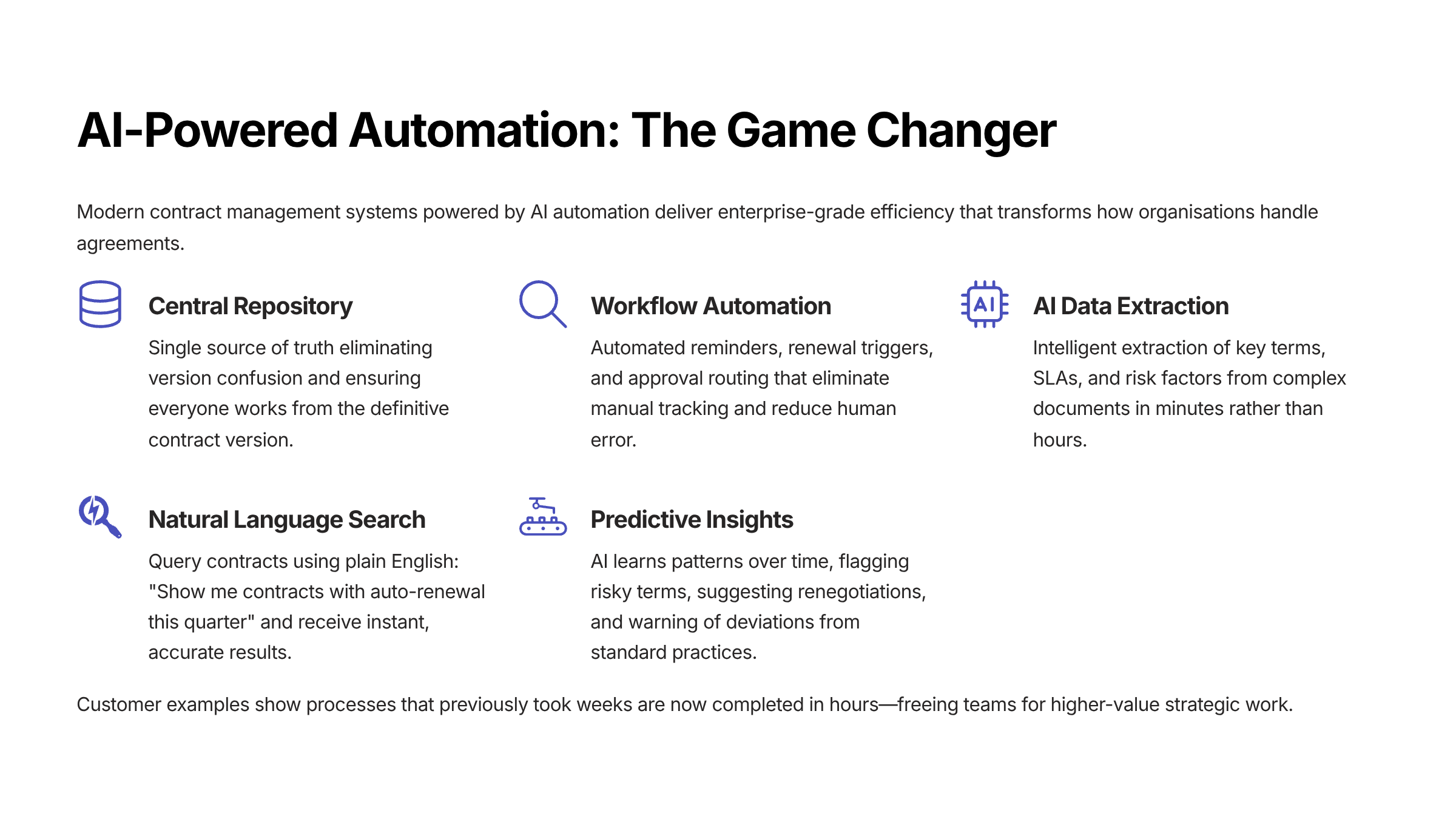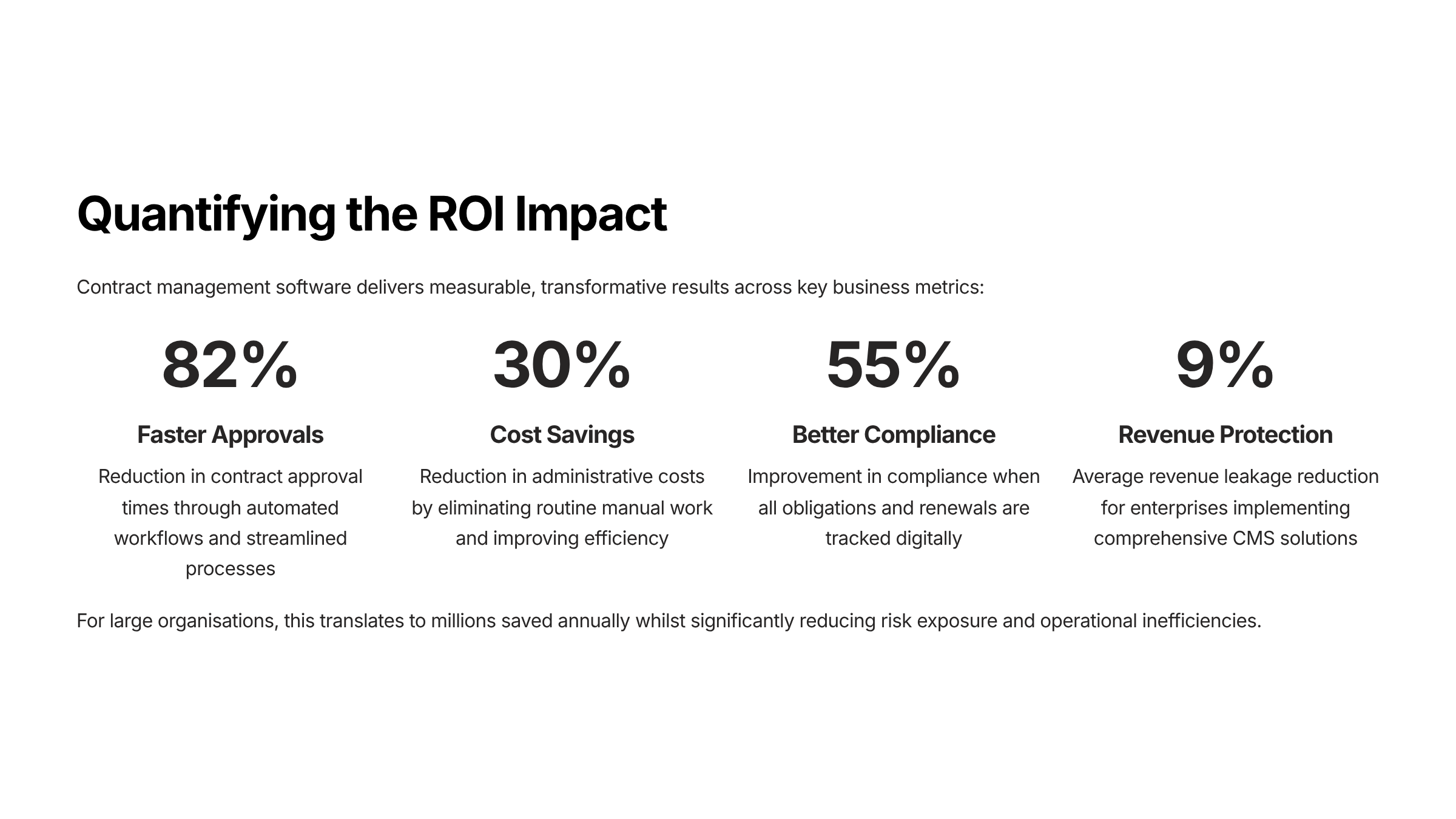Contract Management Software: The Enterprise Sales Playbook for Smarter Deals
Article written by
Kate Williams

INSIDE THE ARTICLE
SHARE THIS ARTICLE
Summary
Most companies manage contracts through email chains and track changes, creating revenue-killing delays and compliance risks. This antiquated approach costs millions through missed renewals, lost deals, and productivity drain. Modern contract management software accelerates deal cycles, reduces risks, and can recover $1.8M+ annually while transforming chaotic processes into competitive advantages.
Did you know that organizations lose nearly 9% of annual revenue due to inefficient contract management?
Nine percent. For a billion-dollar company, that’s $90 million leaking out the door each year. Not because of bad products or poor selling, but because contracts—the very backbone of business agreements—aren’t managed well. And that’s why contract management software (CMS) has moved from a back-office admin tool to a frontline competitive weapon. Let's see how.
What Is Contract Management Software (CMS)?
At its simplest, contract management software is a platform that centralizes and automates the entire contract lifecycle. But if you stop there, you’re underselling it. Done right, CMS is the connective tissue between sales, procurement, finance, and legal, ensuring that what’s promised in a deal is what gets delivered—and tracked.
The lifecycle is usually broken into three stages:
- Pre-Signature – Drafting, redlining, risk reviews, compliance checks, stakeholder approvals. This is where legal and procurement often clash with sales over speed vs. protection.
- Signature – Execution, typically via secure e-signature. Short-lived, but critical.
- Post-Signature – The phase everyone forgets. Tracking obligations, monitoring SLAs, ensuring renewals are strategic—not accidental.
Most enterprises pour their energy into pre-signature negotiations. But studies show up to 40% of contract value is lost post-signature when governance is weak. That’s where CMS delivers its true ROI.
Why Contract Management Is Broken Without Software
Contracts are cross-functional nightmares without software.
- Legal wants risk control, version tracking, and audit trails.
- Procurement focuses on supplier terms, costs, and compliance.
- Finance looks for clean spend reporting and revenue recognition.
- Sales just wants the deal closed yesterday.
- IT/Operations cares about tracking SLAs, assets, and services delivered.
When these perspectives live in silos, chaos ensues. According to research, 52% of companies don’t have a defined contract compliance process, and as a result, they lose anywhere between 5–40% of deal value.
And how do most companies still manage contracts?
- Spreadsheets in finance.
- Shared drives in procurement.
- Email trails in legal.
- ERP notes in operations.
This “organized chaos” means that even simple reporting—like “What contracts are expiring this quarter?”—becomes a fire drill. No wonder only 48% of organizations today have a centralized contract management process.

The Contract Management Cycle Framework
There is a four-phase cycle that separates mature organizations from those still firefighting.
Pre-Award (Planning Stage)
- Starts months, sometimes a year, before contract award.
- Involves stakeholder engagement, defining KPIs, creating performance metrics, and mapping risks.
- According to CIPS, this phase has the highest potential for value creation—but it’s also where companies cut corners.
Award
- Formalizing terms, mobilizing suppliers, and activating risk management processes.
- Poorly executed award phases often cause confusion about what’s legally binding and when commitments begin.
Contract Management & Development
- The ongoing phase: supplier reviews, relationship management, and performance monitoring.
- This is where “smart contract managers” spot early warning signals—like missed KPIs or evasive supplier behavior.
End-of-Life
- Renew, retender, renegotiate, or terminate.
- Many contracts fail here because companies leave no runway for retendering or renegotiation.
- CIPS also reminds us: suppliers often carry liabilities after contract expiry. Ending a contract doesn’t mean ending obligations.
Most enterprises overestimate their contract maturity. They assume once a deal is signed, it’s handled. In reality, the CIPS framework shows that most companies are only managing half the journey.

How AI-Powered Automation Transform Contract Management
Traditional CMS reduced admin time. But modern systems, powered by AI automation, unlock enterprise-grade efficiency.
Some game-changing capabilities:
- Central Repository: One “single source of truth.” No more guessing which version is final.
- Workflow Automation: Reminders, renewals, and approvals are all triggered automatically.
- AI Data Extraction: Pulls key terms, SLAs, and risks out of 40-page PDFs in minutes.
- Natural Language Search: Ask, “Show me contracts with auto-renewal this quarter,” and get instant answers.
- Predictive Insights: AI learns over time. It flags risky terms, suggests renegotiations, and warns of deviations from your “standard playbook.”
Someone from Revenue described it as “human-assisted AI”. Why? Because an SLA means one thing to finance (penalties) and another to operations (performance). Context matters. AI highlights the data; humans apply judgment.
And the time savings? In customer examples, processes that took weeks manually are reduced to hours with automation. That’s not just efficiency—it’s freeing people to do higher-value work.

The Best Contract Management Softwares in 2025
Here’s an updated look at top contract management platforms transforming the space:
Platform | Key Strengths | Best For |
Secure AI-powered contract & proposal automation, centralized knowledge libraries, SOC 2 compliance, CRM-native workflows, renewal & compliance tracking | Enterprises needing AI-secured automation with deep sales, legal, and RevOps alignment | |
AI-powered automation, advanced analytics, fast rollout, enterprise compliance (SOC 2, ISO 27001), integrations with CRM/ERP | Large, fast-growing enterprises needing robust automation and security | |
Kanban workflow UI, AI assistant “Kelda”, strong vendor management & integration | Enterprises with large vendor ecosystems | |
Industry-leading AI, deep integrations, compliance/risk governance, customizable dashboards | Global enterprises with the highest contract complexity | |
AI-powered CLM, risk analytics, strong on performance reporting and usability | Enterprises prioritizing analytics and visibility | |
Comprehensive CLM with mobile access, clause management, easy onboarding | Public sector/regulated, organizations demanding flexibility | |
Intuitive UI, rapid deployment, automated workflows, collaborative editing | Mid-sized to large businesses prioritizing adoption |
The ROI of Contract Management Software
Contract management software delivers tangible, measurable results:
- 82% reduction in contract approval times, according to Forrester and Aberdeen.
- 25–30% savings in admin costs by cutting routine manual work.
- Up to 55% improvement in compliance when all obligations and renewals are tracked digitally.
- Average 8.6–9.2% revenue leakage reduction, as documented by WorldCC’s latest research for enterprises.
This translates to millions saved annually—and a significant reduction in risk and lost revenue.

The Sales Playbook for Adopting CMS
Let’s get tactical. As someone who’s seen closely how enterprise sales works, here’s how I’d recommend rolling out CMS without drowning in disruption:
- Start with Post-Signature Governance
- Centralize what you already signed.
- Set automated renewal alerts.
- Create dashboards for executives.
- Automate the Mundane
- Approval routing.
- Reminders.
- E-signature workflows.
- Integrate with Core Systems
- Connect CMS to CRM (Salesforce), ERP (SAP, Oracle), and procurement tools.
- Eliminate duplicate data entry and reconciliation.
- Layer in AI Gradually
- Start with extraction and metadata tagging.
- Then expand to risk analysis and predictive suggestions.
Pro tip? Don’t aim for revolution—aim for evolution. Incremental wins build buy-in.
Conclusion
Contracts are the backbone of enterprise revenue enablement. A poorly managed contract doesn’t just create risk—it bleeds value.
Done right, CMS transforms contracts into a strategic asset:
- Protecting margins.
- Reducing risk.
- Accelerating deal velocity.
- Creating visibility across sales, finance, legal, and operations.
And here’s the kicker for sales professionals: contracts and RFPs don’t live in silos. They’re two sides of the same coin. The smartest organizations are moving toward connected platforms that unify RFP automation, proposal generation, contract execution, and renewal governance.
That’s why I believe platforms like SparrowGenie represent the future. Secure. AI-powered. Designed for sales. It’s not about replacing people. It’s about freeing us from admin chaos so we can focus on what we do best: winning deals, building trust, and driving revenue.
Ready to see how AI can transform your RFP process?
Product Marketing Manager at SurveySparrow
A writer by heart, and a marketer by trade with a passion to excel! I strive by the motto "Something New, Everyday"

